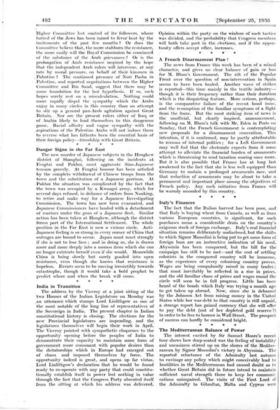Deadlock in Palestine
It was hoped that the discovery that the British Government was in earnest, and the arrival of the first reinforcements at Haifa this week, might have induced the Arab Higher Committee to call off the campaign of violence. This hope has not been realised, and the proclamation of martial law can now hardly be avoided. Where resistance must ultimately be broken, this Arab iNransigeance has 'caused some surprise. Has the Higher Committee lost control of its followers; whose hatred of the Jews has been 'raised to fever- heat by the incitements of the past few. months ? Or does the Committee believe that, the more stubborn the resistance, the more easily will the Royal Commission be convinced of the substance of the Arab grievances ? Or is the prolongation of Arab resistance inspired by the hope that the independent Arab rulers will intervene, at any rate by moral.. pressure, on behalf of their kinsmen in :Palestine ?. The .continued presence of Nuri Pasha in .Palestine, and reported negotiations between the Higher Committee and Ibn Saud, suggest that there may be some foundation for the last hypothesis. If so, such hopes surely rest on- a. miscalculation. Nothing could more rapidly dispel the sympathy which the Arabs enjoy in many circles in this country than an attempt .to stir .up a general pan-Arab agitation against Great -Britain. Nor are the present rulers either of Iraq• or of Arabia likely to lend .themselves to this dangerous game. Racial affinity and vague sympathy with the ,aspirations of the Palestine Arabs will not induce them to. reverse what has hitherto been the essential basis of their foreign policy—friendship with Great Britain. * * * *



















































